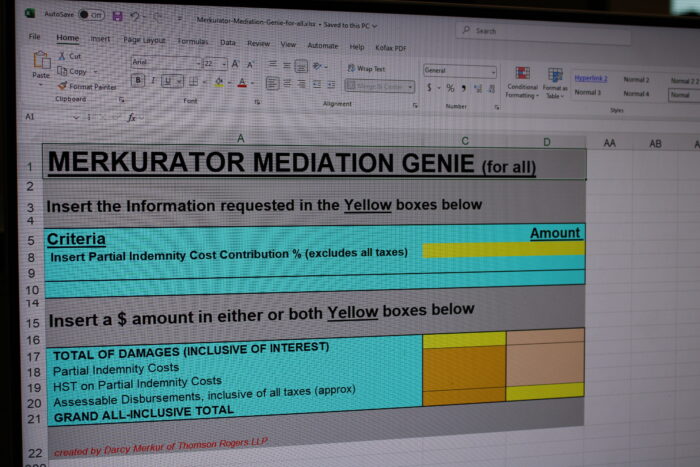I Am Receiving Long Term Disability, Should I Apply For CPP Disability Benefits?
Author(s): Stephen M. Birman*
November 7, 2022
You may be receiving long-term disability benefits (“LTD Benefits”), and your insurance company may have asked you to apply for Canada Pension Plan Disability Benefits (“CPP Benefits”).
This is because, under your LTD Benefits policy, the insurer is likely entitled to deduct from your monthly LTD Benefits payment the amount (if any) that you receive in CPP Benefits.

To meet the CPP Benefits test, you must be suffering from a “severe and prolonged” disability. This means you have suffered a “mental or physical disability that regularly stops you from doing any type of substantially gainful work” and “that is long-term and of indefinite duration or is likely to result in death.”
In TR Law’s recent successful jury case, Baker v. Blue Cross (Baker), a short summary of which is provided here, the insurance company argued that the Plaintiff’s acceptance for CPP Benefits is not a relevant consideration in an LTD Benefits dispute. The insurance company went to great lengths to try and ensure the jury was not allowed to hear about CPP Benefits. A similar argument appears to have been made in another recent Ontario Superior Court decision [Fraser v. Fenchurch General Insurance Company, 2022 ONSC 6222 (“Fraser”)]. In both cases, the Court held that the evidence of the approval of CPP Benefits was admissible.
In both Baker and Fraser, the Plaintiff had been approved for CPP Benefits. In practice, LTD insurers typically recognize that a Plaintiff who meets the CPP Benefits tests also meets the test under the LTD policy and pays LTD Benefits accordingly. The LTD insurer receives the benefit of the CPP Benefits approval by virtue of the LTD insurer being able to deduct the monthly CPP Benefit from its monthly payment obligation.
However, in Baker, the insurer continued to deny LTD Benefits even after the CPP Benefit was approved in the Plaintiff’s favour and up to and including trial. At trial, the jury found that the insurer had improperly withheld benefits for over 6 years and ordered payment of punitive and aggravated damages to the Plaintiff.
During the trial, the insurer attempted to preclude the jury from hearing any evidence regarding CPP Benefits. The Honourable Vella J. ruled that the receipt of CPP Benefits was relevant to the Plaintiff’s claims. A copy of the Court’s Oral Endorsement is attached here.
In Fraser, the Court held that an insurer’s failure to consider the approval of CPP Benefits could be considered as part of a punitive damages claim. The claim proceeded to trial with respect to extra-contractual damages. The Court acknowledged that an insurer’s failure to reconsider an LTD denial in the face of a CPP approval could constitute a basis for a punitive damages award (though it was not the basis for the punitive damages award in Fraser, where the insurer had apparently reinstated benefits by the time it became aware of the CPP approval).
It is surprising that any insurer would maintain an LTD Benefits denial when a Plaintiff has been approved for CPP Benefits, given the nature of the CPP Benefits test. Insurers who deny LTD Benefits after a CPP Benefits approval (or who do not reconsider an LTD Benefits denial after a CPP Benefits approval) should carefully consider the logic in that position. Moreover, insurers who believe they can exclude the fact of a CPP Benefits approval from the evidence at trial should carefully consider these recent cases.
In both Baker and Fraser, punitive and aggravated damages were ordered against the LTD insurers. In my view, Plaintiffs who have been approved for CPP Benefits and denied LTD Benefits (either before or after the CPP Benefits denial) should consider a claim for extra-contractual damages (aggravated and/or punitive damages) against their own insurer, who has an obligation to act in good faith when administering their claim.
Where an individual is unable to return to work and is facing a dispute with their LTD Benefits insurer they should pursue a CPP Benefits claim as doing so may not only provide financial relief but it is likely required under the policy. Moreover, if successful, it may lead to the LTD insurer reconsidering its position or risking a reputationally damaging punitive damages award.
Stephen Birman was trial counsel in Baker v. Blue Cross, along with Robert Ben and Lucy Jackson. A copy of the Court’s Endorsement regarding CPP Benefits is attached. A copy of the trial Judgment can also be found here. The insurance company has appealed the awards of punitive and aggravated damages. If you have been denied LTD Benefits, feel free to contact the LTD Benefits team at Thomson, Rogers for a free consultation
Share this





